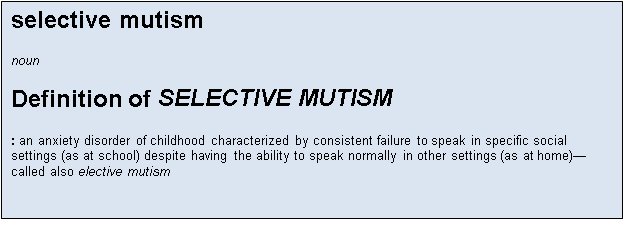Imagine….
Someone says ‘HI’ and you feel paralyzed by fear and can’t say ‘HI’ back….
The fear of being asked a question at school….
Falling and hurting yourself and not being able to cry or ask for help because of the fear that someone might hear you…..
This is the real everyday life of a child or adult with Selective Mutism.
My daughter Peanut is 8 and was diagnosed Selective Mutism at 6 years of age although the evidence was there from a very young age. Even as an infant she was slow to warm up to other people and for months only wanted Mommy or Daddy despite how often she saw someone else.
Peanut was in a home daycare from the age of 13 months until Pofaroo was born when she was just over 3 years old. In that time, not once did Peanut utter a word to the husband of her daycare provider or any adult that happened to enter the home. ‘Shy’ is what everyone said and ‘Don’t worry she’ll grow out of it’. Only that wasn’t the case at all.
Once she started school, it became even more clear that it was more than just being ‘shy’. While she was able to speak with her peers in small groups, she was never able to speak to an adult at school and was never able to participate in Tell and Show. Stomach aches became the norm on the way to school and I didn’t know how to fix it.
After a lot of internet research, I knew in my heart that it was Selective Mutism.
I contracted our local family support agency via their intake services and the wait began.
It was 2 months before we had a meeting with the intake worker and another 4 months before we were able to see a psychiatrist for an assessment and diagnosis – and it was exactly what I thought – Selective Mutism.
With very little information or treatment for Selective Mutism, we’ve been stumbling our way through the ups & downs of trying to find what works and what doesn’t for Peanut.
The severity of Selective Mutism ranges for each child diagnosed. Some, like my daughter, are able to speak in a normal voice to peers in the schoolyard and an almost normal voice to peers in the classroom. She laughs and despite also having a diagnosis of social anxiety, doesn’t present as such with her peers. Add an adult into the mix and she becomes silent and an anxious look crosses her face.
The most severe forms of Selective Mutism have children in a world of silence! They hear all that is going on around them and understand everything however remain completely silent….even with their immediate family.
They say there are more children with Selective Mutism than have Autism or ADHD. A staggering number of children in fact and most don’t get the treatment they need due to funding or the cost for private CBT – Cognitive Behaviour Therapy. Untreated, Selective Mutism can lead to other anxious behaviours like OCD or GAD.
Here’s how you can help! With the little bit I’ve told you about Selective Mutism, know that the child that appears shy or can’t say ‘Please’ or ‘Thank You’ could be a child with Selective Mutism. Understand that saying ‘Cat got your tongue?’ or ‘Can you talk?’ only increases the anxiety that child feels EVERY day!
Have you ever met a child with Selective Mutism? Chances are you have and didn’t know it.




One of my relative’s children had selective mutism, but it played out quite differently than in the article. The best intervention was for family members to stop “rescuing’ her from having to speak (not bending down so she could whisper to them etc)…the problem then resolved itself quickly.
Hi Jay, Thank you for your comment. For some yes they ‘outgrow’ their SM however for the majority with SM, they do need some form of assistance to get past their SM whether in the form of CBT and/or medication. Since SM is not actually the issue, rather it’s the underlying anxiety, it can be quite difficult to overcome. We’ve chosen not to medicate our daughter and have tried many options including not ‘rescuing’ her. We have made progress and we’re slowly working our way for her to be comfortable enough to speak.
There is no cure for SM. You never “outgrow” it. It is an anxiety disorder. Ask a person to “outgrow” diabetes or aspergers – they can’t. Children grow up to be teens and adults with SM who cope with it. Possibly with medication and/or therapy. Some live fulfilling lives. Others live alone, jobless afraid to make friends. We don’t hear about Walk-a-thons for SM – no one talks about it – literally. We live close to Boston, Massachusetts where acclaimed doctors and hospitals are located yet we have struggled to find help for our son for 9 years. He started talking and does well but still has SM and always will. He tries new things. Sometimes he does great. Sometimes he falls hard. We pick him up, brush him off and start over. He is awesome. Selective Mutism is only a piece of him – not all of him. Hug your child – even if they are silent – because they are screaming for acceptance inside.